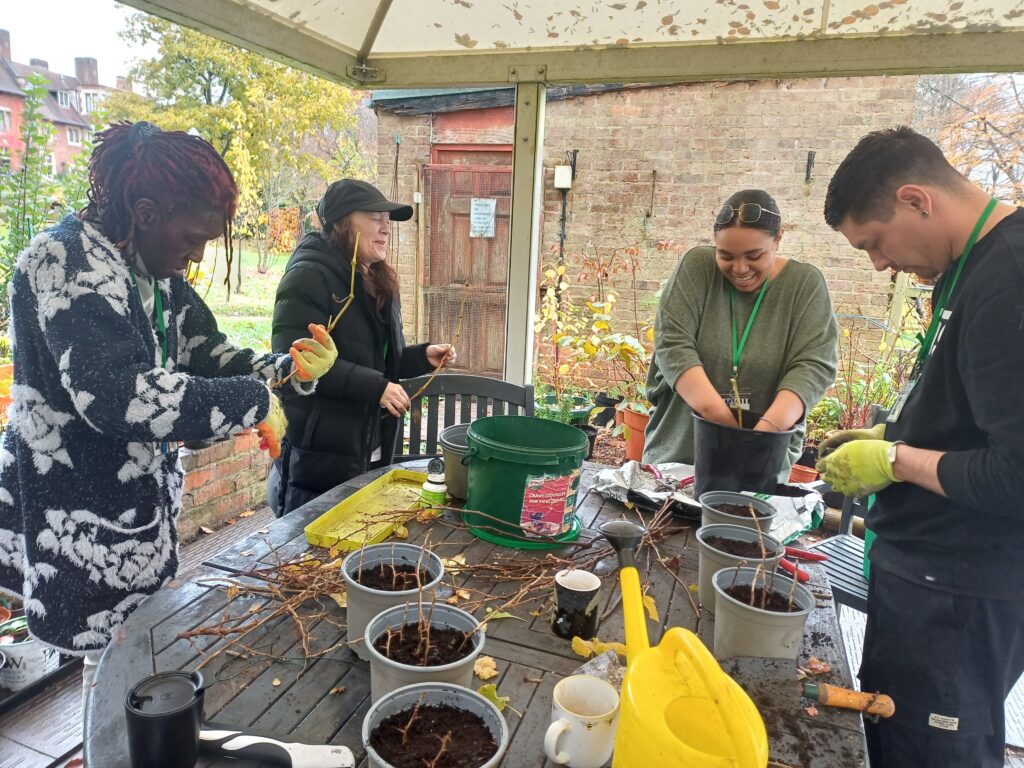Community empowerment skills for adults

Further Education Colleges must approach their future strategies for green skills in the most ambitious and radical ways possible, taking a transformative posture and looking towards their neighbourhoods as sites for collaborative learning and knowledge exchange.
Opportunities for Adult Education in Neighbourhoods
Colleges have a long history of providing adult education, but in recent years provision has shifted away from community-based learning.
In Opportunities for Adult Education in Neighbourhoods, co–authored by CIVIC SQUARE, Material Cultures, Scott McAulay, Architype, and The Anthropocene Architecture School, for this Green Skills Roadmap, further education colleges are invited to reconsider the role they play in their communities.
Using flexibilities in WMCA’s adult education funding, colleges across the West Midlands and Warwickshire could play a critical role in community empowerment in the context of green skills and climate change.
But this might require a radical reimagining of adult education provision ‘to a point at which green skills become an opportunity to foster social cohesion, flourish with nature, stimulate local enterprise, and promote educational equity.’ (Opportunities for Adult Education in Neighbourhoods)
Colleges might also re-consider their relationships with neighbourhoods. Neighbourhoods are small scale enough to be tangible, impactful, and deeply participatory and could be the critical focal point of reimagined, community-focused, green skills learning provision.
What might re-imagined neighbourhood green skills learning include? Opportunities for Adult Education in Neighbourhoods argues for:
- neighbourhood trade schools.
- peer to peer learning.
- community convening.
- learning experience which weaves into everyday neighbourhood life.
- repurposing of educational infrastructures, creating the capacity for people to work together in place.
For example, the provision of retrofit skills learning programmes for neighbourhoods might be founded upon a nuanced understanding of how built environment practices impact climate change and social outcomes.
And with significant buildings, resources, and infrastructure, there is an opportunity to make the assets that colleges have more available to communities.
For example, the maintenance and upgrade of a college’s physical infrastructure could be imagined as an opportunity to practically implement green skills for learners through deconstruction, retrofit, or repair.
Might the green skills challenge present an opportunity for a renaissance in community-based learning for FE colleges in the West Midlands and Warwickshire?



Case Studies

In its commitment to social and climate justice, Fircroft College offers programmes which engage learners in sustainability and green skills projects, and which empower community groups. The ‘Mother Garden’ programme offers learners hands-on gardening activities to enhance their own growing spaces, promote community cohesion, and spark fresh sustainability initiatives. The programme equips learners with the knowledge and skills of Mother Gardens, enabling them to apply these principles to their community’s green spaces. After completing the programme, participants regularly contribute to community food projects, establish their own Mother Gardens, and collaborate on initiatives such as urban forest communities and nature conservation. For instance, Lorna, a Fircroft Mother Garden learner, shared harvested pumpkins with her mothers’ group and promoted gardening through her seed sharing.
You not only benefit from the fresh air when you’re outdoors, you are also mindful in the pursuit of growing. Socialising with other people who all had the same purpose but came from different backgrounds, was really interesting too.
Lorna - a Fircroft Mother Garden learner
Signposting for colleges
Community empowerment skills for adults
Recognise and showcase best practice.
Colleges should ...
Celebrate success and showcase best practice with green skills adoption to all stakeholders using a wide range of channels.
Pilot new community-based provision in green skills.
Colleges should ...
Colleges should, with support from WMCA, pilot new and innovative community-based provision to support empowerment in green skills.
Partner with community groups on green skills.
Colleges should ...
Partner with community groups to engage people locally in projects that support sustainability and green skills.
Develop programmes to support community-based sustainability initiatives.
Colleges should ...
Using WMCA flexibilities in adult education funding, some colleges, working in partnership with community groups, could develop adult education programmes designed to provide adults with the skills to engage in community-based sustainability initiatives including programmes in:
- Sustainable and organic community gardens.
- Rewilding your neighbourhoods.
- Creating and caring for green spaces.
- Saving on fuel bills.
- Retrofitting green technologies on your house.
- Recycling and upcycling.
- Sustainable travel.

